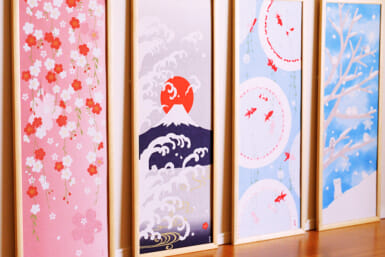by James Bailey
Japan, we all know, is a drug-free society. How else would you describe a country with one of the world’s highest rates of consumption of a substance as addictive as heroin?
But while the government turns a blind eye to the ciggie-puffing populace, it employs its bloodhoundlike nose in the sniffing out of controlled substance abusers. And well it should: by resolutely refusing to decriminalize use of marijuana, for example, the powers-that-be have spared us the spectacle of potheads reeling arm-in-arm through the streets, exhaling their odious potbreath in the faces of complete strangers, singing pot-toking songs till all hours of the morning, publicly vomiting and urinating, unable to hold noxious pot-smoke in their systems.
Come on, would you want to ride a late night train filled with people like these?
The use of cocaine by arrested film mogul Haruki Kadokawa, if true, is to be deplored, especially by those not invited to any of his parties. Nevertheless, the manner in which he and other disgraced figures in the domestic entertainment industry have allegedly acquired their drugs over the past several years should serve as a shining example to those many foreign businessmen who have whined about the difficulty they encounter in getting their products to local consumers.
To hear the vernacular press tell it, nothing stands in the way of independent gaijin entrepreneurs and their high-profile Japanese customers.
When police arrested Yosui Inoue in 1977 for marijuana possession, the popular evening tabloid Yukan Fuji reported that the folk singer—and the country’s top money-earning entertainer for the two previous years, according to the Tax Administration Agency— had been supplied by a “foreign hippie.”
At this particular stage in his career, Inoue was somewhat standoffish, neither making TV appearances nor giving interviews, but said foreign hippie, displaying an initiative that would put a Harvard M.B.A. to shame, nonetheless managed to meet the man and make a sale. Or so said Yukan Fuji.
Yet another example of the American go-getter spirit was provided in ’83 with the arrest of actor-vocalist Kenichi Hagiwara. The Tokyo Shimbun termed the news a profound “shokku,” then went on to note that Hagiwara was the 39th entertainment industry figure in the past six years either arrested or questioned by the police about drug possession, which would seem to suggest an infinite capacity for surprise on the part of at least one member of the Fourth Estate.
The paper opined that the two likeliest sources for Hagiwara’s drugs were either: (a), visits to foreign countries; or (b), local foreigners and persons connected with the American military. Given that the Prime Minster’s Office had just released a poll showing that two-thirds of all Japanese wanted nothing to do with foreigners, the drug sale was either the result of Hagiwara’s rejection of xenophobic insularity or the gung-ho desire of some $573-a-month PFC to do biz with a $300,000-a-year entertainer. We prefer to think the latter.
The year 1983 also saw the appearance of one of the most dedicated of gaijin salespersons, the “unknown foreign male.” Actress Sumiko Sakamoto, relaxing at poolside in Hawaii and minding her own business, was approached by an unknown foreign male who dropped a packet on her chaise lounge. Naturally, she did what any right-thinking individual would: without checking the contents of the packet, she packed it in her luggage and, upon returning to Japan, was told by Japanese officials it contained drugs. Boy, was she surprised!
The story unfolding in the Kadokawa case contains both good and bad news for gaijin pushers. The good news is that the cocaine came from America; the bad news that the cocaine came from a Japanese residing in America. Given that local newspapers have almost invariably managed to locate foreign suppliers in high-profile drug cases, the decision by this individual to get in on the action is as ominous a development as was the decision by Japanese companies to start manufacturing this newfangled American invention called the VCR. First, average Japanese will start supplying, and where will that lead to?
Why, who knows, the papers may some day report that Japanese criminals have started dealing in drugs.








